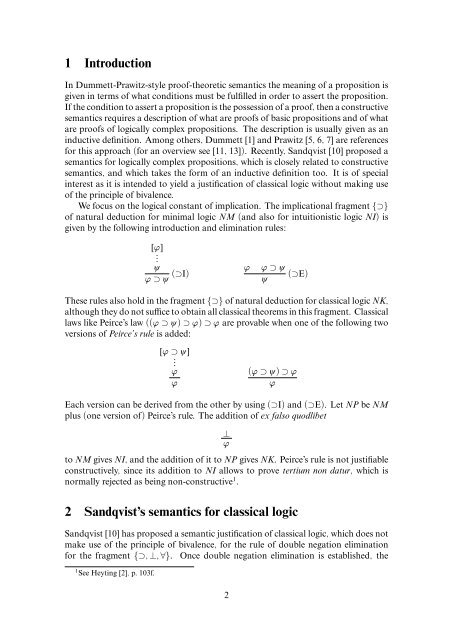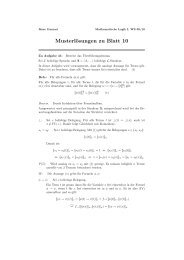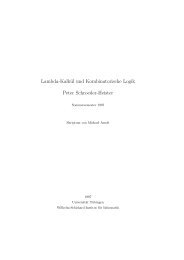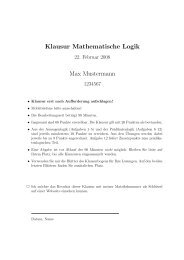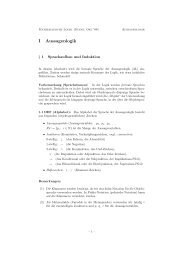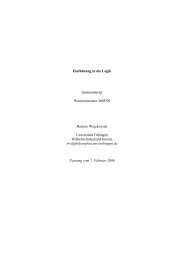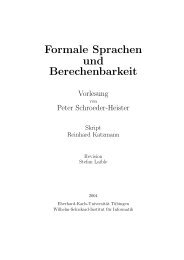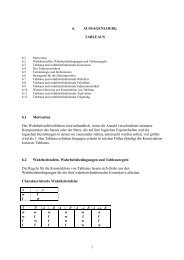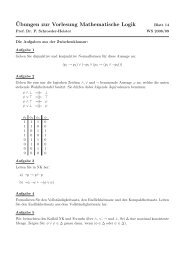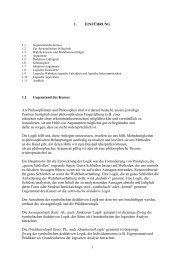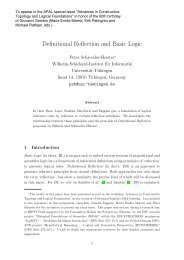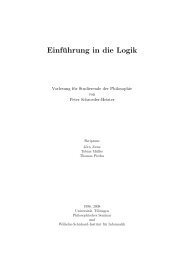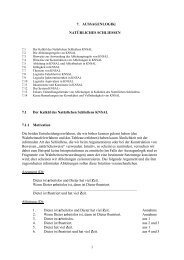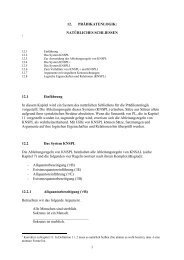Constructive semantics and the validity of Peirce's law
Constructive semantics and the validity of Peirce's law
Constructive semantics and the validity of Peirce's law
Create successful ePaper yourself
Turn your PDF publications into a flip-book with our unique Google optimized e-Paper software.
1 Introduction<br />
In Dummett-Prawitz-style pro<strong>of</strong>-<strong>the</strong>oretic <strong>semantics</strong> <strong>the</strong> meaning <strong>of</strong> a proposition is<br />
given in terms <strong>of</strong> what conditions must be fulfilled in order to assert <strong>the</strong> proposition.<br />
If <strong>the</strong> condition to assert a proposition is <strong>the</strong> possession <strong>of</strong> a pro<strong>of</strong>, <strong>the</strong>n a constructive<br />
<strong>semantics</strong> requires a description <strong>of</strong> what are pro<strong>of</strong>s <strong>of</strong> basic propositions <strong>and</strong> <strong>of</strong> what<br />
are pro<strong>of</strong>s <strong>of</strong> logically complex propositions. The description is usually given as an<br />
inductive definition. Among o<strong>the</strong>rs, Dummett [1] <strong>and</strong> Prawitz [5, 6, 7] are references<br />
for this approach (for an overview see [11, 13]). Recently, S<strong>and</strong>qvist [10] proposed a<br />
<strong>semantics</strong> for logically complex propositions, which is closely related to constructive<br />
<strong>semantics</strong>, <strong>and</strong> which takes <strong>the</strong> form <strong>of</strong> an inductive definition too. It is <strong>of</strong> special<br />
interest as it is intended to yield a justification <strong>of</strong> classical logic without making use<br />
<strong>of</strong> <strong>the</strong> principle <strong>of</strong> bivalence.<br />
We focus on <strong>the</strong> logical constant <strong>of</strong> implication. The implicational fragment {⊃}<br />
<strong>of</strong> natural deduction for minimal logic NM (<strong>and</strong> also for intuitionistic logic NI) is<br />
given by <strong>the</strong> following introduction <strong>and</strong> elimination rules:<br />
[ϕ]<br />
.<br />
� (⊃I)<br />
ϕ ⊃ �<br />
ϕ ϕ ⊃ � (⊃E)<br />
�<br />
These rules also hold in <strong>the</strong> fragment {⊃} <strong>of</strong> natural deduction for classical logic NK,<br />
although <strong>the</strong>y do not suffice to obtain all classical <strong>the</strong>orems in this fragment. Classical<br />
<strong>law</strong>s like Peirce’s <strong>law</strong> ((ϕ ⊃ �) ⊃ ϕ) ⊃ ϕ are provable when one <strong>of</strong> <strong>the</strong> following two<br />
versions <strong>of</strong> Peirce’s rule is added:<br />
[ϕ ⊃ �]<br />
.<br />
ϕ<br />
ϕ<br />
(ϕ ⊃ �) ⊃ ϕ<br />
ϕ<br />
Each version can be derived from <strong>the</strong> o<strong>the</strong>r by using (⊃I) <strong>and</strong> (⊃E). Let NP be NM<br />
plus (one version <strong>of</strong>) Peirce’s rule. The addition <strong>of</strong> ex falso quodlibet<br />
⊥<br />
ϕ<br />
to NM gives NI, <strong>and</strong> <strong>the</strong> addition <strong>of</strong> it to NP gives NK. Peirce’s rule is not justifiable<br />
constructively, since its addition to NI allows to prove tertium non datur, which is<br />
normally rejected as being non-constructive 1 .<br />
2 S<strong>and</strong>qvist’s <strong>semantics</strong> for classical logic<br />
S<strong>and</strong>qvist [10] has proposed a semantic justification <strong>of</strong> classical logic, which does not<br />
make use <strong>of</strong> <strong>the</strong> principle <strong>of</strong> bivalence, for <strong>the</strong> rule <strong>of</strong> double negation elimination<br />
for <strong>the</strong> fragment {⊃, ⊥, ∀}. Once double negation elimination is established, <strong>the</strong><br />
1 See Heyting [2], p. 103f.<br />
2


